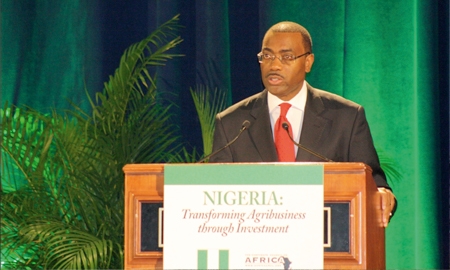Getting food out of the ground and onto the table is a task not taken lightly in a country where there are 170 million mouths to feed. Fortunately, farming is something that Nigerians are very, very good at, and they have been blessed with the right climate and soil for the job. But now the entire agricultural sector is set to shift its focus away from family-centred subsistence farming and take it to the next level where new jobs, new wealth and new markets for farmers pave the way towards Nigeria’s ultimate goal of agricultural self-sufficiency.
Minister of Agriculture and Rural Development Akinwumi Adesina is famous for always having the figures at his fingertips. He is wagering his public prestige, which is considerable, on the targets he has established being met or exceeded. He insists that a structured transformation agenda will see farm output triple in value from its current turnover of $99 billion (£62 billion) to reach $300 billion by 2030.
According to Dr Adesina, a rationally industrialised, ecologically compliant agricultural sector will lead to a boost in domestic food production on the order of 20 million metric tonnes and create an additional 3.5 million jobs by 2015 – no small accomplishment in a country where farming at present occupies 70 per cent of the working population. Each initiative will have a youth training component so that the agricultural reboot he is proposing will create the maximum number of new jobs.
The key for successful reform is to turn agriculture into a business that makes money, with a focus on investment, not aid.
Akinwumi Adesina, Minister of Agriculture and Rural Development |
He insists his optimism is a matter of arithmetic rather than rhetoric. “Our biggest focus now is on rice, to make Nigeria self-sufficient in rice. We have completed three new integrated rice mills, producing a long-grain parboiled rice of very good quality that is competitive with imported rice from Thailand and India,” he says.
Foreign investors have already become involved in Nigeria’s priority programme for curtailing rice imports, contributing to the capitalisation of at least one large-scale facility for producing and milling rice in Taraba state. “Just this one 30,000 hectare farm complex will produce 300,000 metric tonnes of rice, equivalent to 15 per cent of our current imports,” the Minister notes. An unidentified American investment group has pledged $6 billion to the farm sector and “we are in talks with China on the financing that would allow the private sector to acquire 100 new industrial scale mills that can process 2.1 million metric tonnes, equivalent to all the rice consumed in Nigeria. Rice farmers would stand to make $2 billion.”
Limiting imported staple foodstuffs whenever it is feasible to do so will allow Nigeria to spend revenues from its petroleum resources on more worthy initiatives such as development and critical social services. Until the 1970s, Nigerians ate what they grew: cassava, yams, sorghum millet, and beans – and were happy enough to do so. Now they depend on imported, mostly American, wheat for their daily bread and Dr Adesina is determined to do something about that.
“We are promoting ‘Nigerian bread’ that is made out of 40 per cent high quality cassava flour. We have drawn up new fiscal policy measures to encourage millers and bakers to use high quality cassava flour and raised the tariffs on imported wheat. As from December 2013, all millers must meet the requirement for 40 per cent wheat substitution.”
Another key step is the opening up of the market that provides farmers with essential insurance coverage by abolishing the monopoly status of government-owned Nigerian Agricultural Insurance Corporation, thus allowing private companies to compete with lower premiums for the right to provide specialised coverage to some 120 million individuals.
Perhaps the most innovative aspect of Dr Adesina’s reforms is the extent to which he has altered the paradigm of government involvement in the farm sector. Since the 1970s, previous governments had undertaken to procure and distribute subsidised seeds and fertiliser to Nigeria’s farmers. The trouble was that many of these supplies were diverted onto the black market before it could reach the farmers who really deserved to have them. Now, however, farmers who really are entitled to a total or partial subsidy on fertiliser and seeds will have to present a SMS code sent to their mobile phones to claim their allocation directly from local retail suppliers. “We found that 75 per cent of farmers in rural areas have phones, and so we are moving into the e-wallet system,” the Minister remarks.
In an even more startling departure from previous practice, Dr Adesina went to commercial banks to secure the financing for the fertiliser and seeds distributed for the 2012 harvest, and has interested the bankers in similar programs where the government backs up the loans and the banks pony up the money at a reasonable rate of interest, to be leveraged into agricultural value chains.
Dr Adesina says, “The key for successful reform is to turn agriculture into a business that makes money, with a focus on investment, as opposed to aid and development. We need to move towards focusing on particular value chains in which we have a traditional comparative advantage. Our resolve is strong as ever that we will transform Nigeria’s agriculture. Together we can make Nigeria a food breadbasket for Africa and the world.”

1 COMMENT
Let nigerians get enough food in the country to purchase at a very cheap rate and subsidised rate,Nigerians should have atleast 4 to 5 squaremeal a day.People are not living a good life uptimally.Let us see and feel the impact of the prowess and the enthusiasm of the minister in providing cheap food in the market,That is what Nigerians want,Poverty is everywhere.Flood the Market with enough and cheap food.